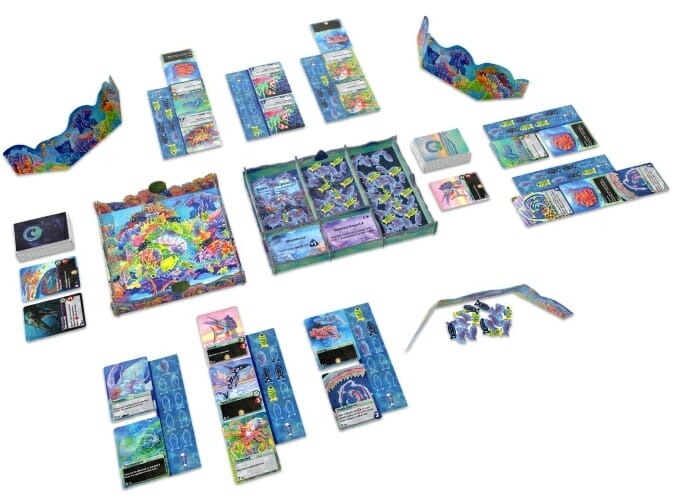Oceans Is a Beautiful Board Game that Improves on 2014’s Evolution

Oceans is a new, standalone sequel game to 2014’s Evolution, which itself has spawned several expansions and an outstanding digital adaptation released last year. Both games borrow concepts from natural selection by having players form species and play traits on them to make them stronger predators, improve their defensive abilities, or otherwise help them survive the game’s process of not-quite-natural selection, but Oceans smooths out some of the gameplay issues in Evolution for a better playing experience.
As the name might have told you, Oceans is set in the seas, as players will build aquatic species and will draw food from four different layers of the ocean—at least until they start attacking each other, which is a core part of the game and works better here than it did in Evolution. As in the preceding game, Oceans revolves around Trait cards, which you can play to the table to create a new species or play to modify a species you’ve already created. You can have up to three Trait cards on each species, and may discard a played Trait at any time to play a new one to that species. You can also discard a Trait card to move food tokens between the zones available to all players, which can be a self-serving move or a strategic move to mess with your opponents’ species.
The goal in Oceans is to end the game with the most (consumed) food tokens, as you’ll take one off of each of your species cards during each round and sometimes will get to use Trait cards to take more. Thus feeding your species is the heart of the game. The Trait cards on a species will determine if it can Forage for food by taking it from the highest zone that still has food in it, or if it can attack other species for food, or can do either. Many Trait cards also forbid that species from doing one or the other, forcing you to make that species a forager or a predator.
On each turn, you play one or two trait cards, then feed one of your species by foraging or attacking. Once that’s complete, you’ll remove one food token from every one of your species to score it at game-end and then draw cards to get your hand back up to six. Turns are thus quite simple and should move quickly once everyone is familiar with the game’s mechanics, although the Trait cards you’ll draw from the special Deep deck are all unique and players may spend a few moments considering how those cards will play out on the table.
-

-

-

-

-

-

-

-

-

-

-

-

-

-

-

-

-

-

-

-

-

-

-

-

-

-

-

-

-

-

-

-

-

-

-

-

-

-

-

-









































